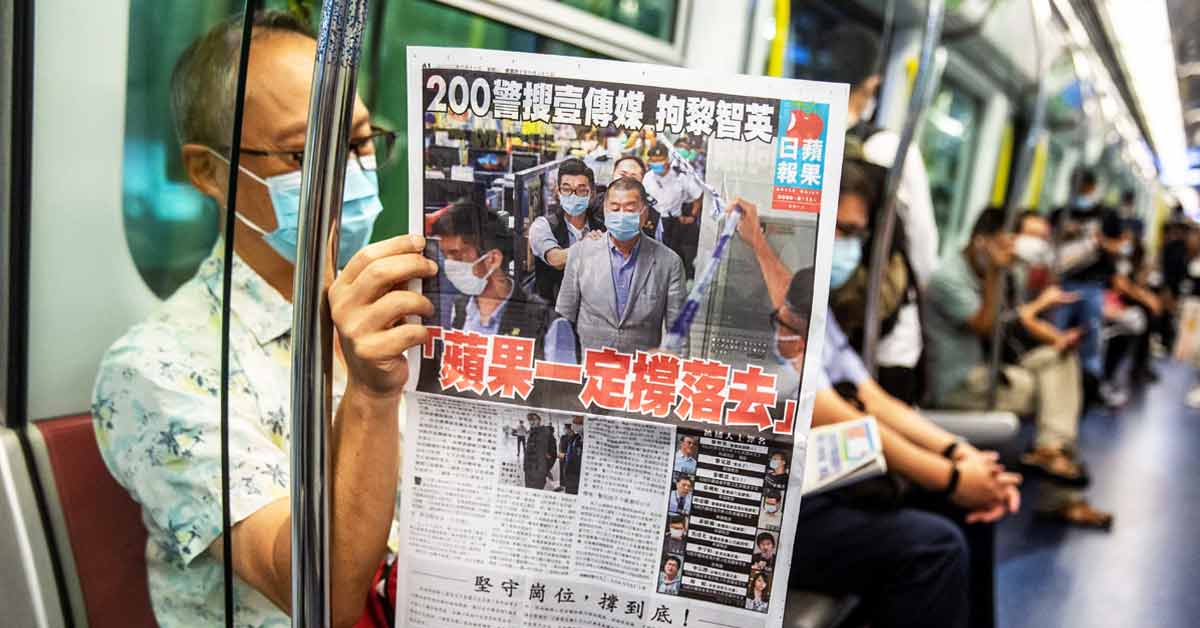Authorities last week froze HK$18 million (US$2.3 million) of assets owned by three companies linked to Apple Daily.
Mark Simon told the BBC that the paper could "do nothing while none of its bank accounts are functioning".
Apple Daily, a well-read tabloid, is frequently critical of Hong Kong and mainland Chinese leadership.
"If you don't have money, you can't order services. Most importantly, you can't promise to pay people when you don't have access to the cash to cover those expenses. That's illegal in Hong Kong," said Mr Simon.
"The paper is still on the newsstands today but it is only a matter of days before it won't be there unless its bank accounts are unfrozen."
The paper's publisher, Next Digital, is holding a board meeting on Monday to discuss the paper's future.
Apple Daily had on Sunday said it only had enough cash to continue normal operations for "several weeks".
What's The Situation At Apple Daily?
Last Thursday, some 500 police officers raided the offices of Apple Daily in Hong Kong, saying its reports had breached the national security law.
Police also arrested the editor-in-chief and four other executives at their homes and froze HK$18 million (US$2.3 million) of assets owned by three companies linked to Apple Daily – Apple Daily Limited, Apple Daily Printing Limited and AD internet Limited.
Photos published online by Apple Daily showed police going through reporters' computers.
In a statement, police said their warrant "covered the power of searching and seizure of journalistic materials".
In a press briefing later that day, police said that Apple Daily had published more than 30 articles calling on countries to impose sanctions on Hong Kong and mainland China since 2019.
Jimmy Lai, the paper's founder, is currently in jail for a series of charges, including participating in an unauthorised assembly in 2019.
Who Is Jimmy Lai?
Lai is one of the most prominent supporters of Hong Kong's pro-democracy movement. Estimated to be worth more than US$1 billion, he made his initial fortune in the clothing industry and later ventured into media and founded Next Digital.
In May, authorities froze assets belonging to Lai, including his bank accounts and his stake of 71.26 percent in Next Digital – estimated to be worth US$45 million.
Banking giants HSBC and Citibank were also sent letters by Hong Kong's security chief, who threatened up to seven years' jail for any dealings with Mr Lai's accounts in the city.
In his last interview with the BBC before he was sentenced to jail, he said he would not give in to intimidation.
"If they can induce fear in you, that's the cheapest way to control you and the most effective way and they know it. The only way to defeat the way of intimidation is to face up to fear and don't let it frighten you," he said.
What's The Background To This?
The national security law was introduced in 2020 in response to massive pro-democracy protests that swept the city state the previous year.
It essentially reduced Hong Kong's judicial autonomy and made it easier to punish demonstrators. It criminalises secession, subversion and collusion with foreign forces with the maximum sentence of life in prison.
Beijing said the law would target "sedition" and bring stability, but critics have said it violates the agreement under which Britain handed back Hong Kong to China in 1997.
Since the law was enacted in June, more than 100 people have been arrested under its provisions, including Lai. – BBC
